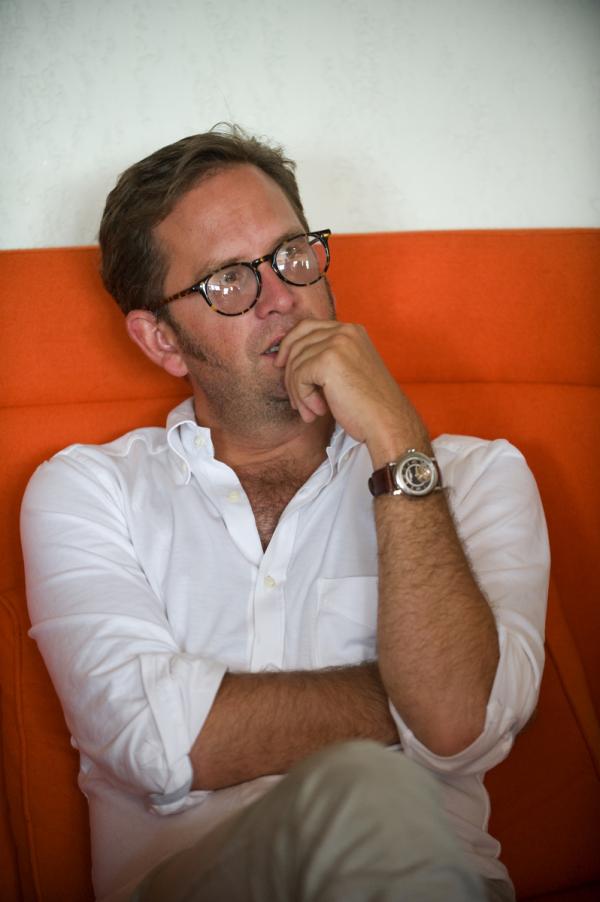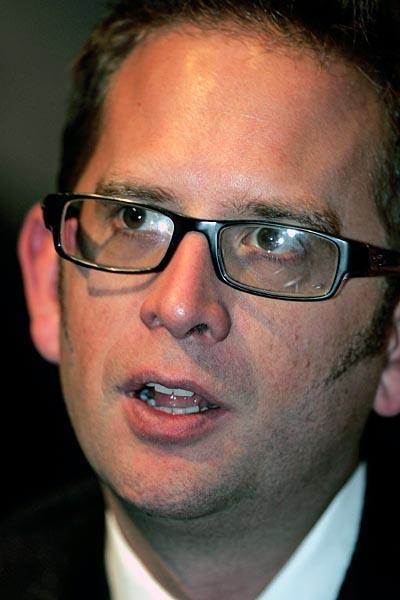Vaughters to preside over AIGCP teams organisation
Two more years and a hunt for a managing director


American Jonathan Vaughters has been elected to two more years as president of the professional teams organisation, the AIGCP (Association International des Groupes Cyclistes Professionels).
After a successful first term in which all of the sport's top teams have been re-integrated into the previously fractured group, Vaughters and the board are looking to hire a managing director to further strengthen the ability of the AIGCP to push for the rights of teams.
Vaugthers, who also heads the Garmin-Transitions team, plus Robert Amadio (Liquigas-Doimo), Jean-Rene Bernadeau (BBox Bouygues Telecom), Johan Bruyneel (Radioshack), Luuc Eisenga (Rabobank), Bjarne Riis (Saxo Bank) and Eusebio Unzue (Movistar) make up the board which will oversee the position of managing director, which has yet to be filled.
"Teams are so big nowadays, that it takes all your time to run them, so we decided to hire a managing director who will be independent from any of the teams, and be able to express the opinion of the AIGCP objectively and without bias," Vaughters told Cyclingnews.
"I'm happy to continue to serve and do my part to make sure that the rights of the teams aren't overlooked," he explained, adding that the decision to hire a director helped convince him to remain in the job.
"This person will push forward on a lot of the work that needs to be done in an association that big. If you combine the top 20 teams, we're representing 2500 employees and 400 million dollars in revenue. It needs representation, and it needs someone who isn't having to focus on other things.
In the past two years, the organisation has made slow progress in bringing all the teams to the table to discuss the most pressing issues in the sport. The first small accomplishment was to get a unified opinion on the UCI's proposed ban on two-way radios in races.
Get The Leadout Newsletter
The latest race content, interviews, features, reviews and expert buying guides, direct to your inbox!
"It was good to see that we were able to get together in our latest meeting and come up with a general position on the radio issue. We were able to debate it objectively as a democratic association and vote on it and come up with an official position," he said. The teams opposed the ban 26-2.
The number one issue
Vaughters said the top goal of the next term will be making sure the teams have a say in how the rules of participation in major events are decided upon.
The UCI signed an agreement in 2008 with the race organisers whereby the top 17 teams in the UCI world rankings at the end of 2010 would be automatically invited to the 2011 Tour de France. The UCI announced this year it had changed those rules, but team managers were still in the dark as to exactly how the selections would be determined.
"You've read a lot about the ASO and the UCI negotiating those rules right now, but the fact of the matter is the largest financial power, which is the teams, collectively, is not part of that discussion," said Vaughters.
"There were no teams represented in 2008 when that contract was signed, and quite frankly we haven't been a part of the [current] discussions. There is a lot of confusion over the rules.
"I think the majority of the teams might have some good ideas about a new system that might be fair, but both of those systems were designed with very minimal input by the AIGCP."
Vaughters said that he liked the idea of a team ranking system, "but it seems to me it would be more interesting if we could come up with a way to promote the ranking system and everyone's gunning to be the number one team in the world - instead of teams fighting not to be the 18th-or 19th-ranked team."
One word that arises many times is "stability", and Vaughters thinks that the uncertainty of race participation as a key issue that needs to be addressed in order for cycling to raise its status in the sporting world. The UCI's attempt at creating a sort of league through the ProTour hasn't achieved that goal - teams are still at the mercy of race organisers, and if they can't get into the big races and get results, they stand to lose sponsors and disappear from the sport.
Without a constant roster of teams from year to year, Vaughters believes it will not be possible to rid the sport of its biggest problems.
"As long as there's instability in cycling we won't be able to root out the core ethical problems. This is one thing I'm passionate about.
"Cycling is always in a state of flux, and that makes it difficult for the sport to ever get the stability it needs. With stability comes greater guarantees of anti-doping because there is less pressure - the contract monster isn't coming up behind you all the time.
"That's just one of the reasons to work toward a system that is more stable and more predictable for all the teams."

Laura Weislo has been with Cyclingnews since 2006 after making a switch from a career in science. As Managing Editor, she coordinates coverage for North American events and global news. As former elite-level road racer who dabbled in cyclo-cross and track, Laura has a passion for all three disciplines. When not working she likes to go camping and explore lesser traveled roads, paths and gravel tracks. Laura specialises in covering doping, anti-doping, UCI governance and performing data analysis.